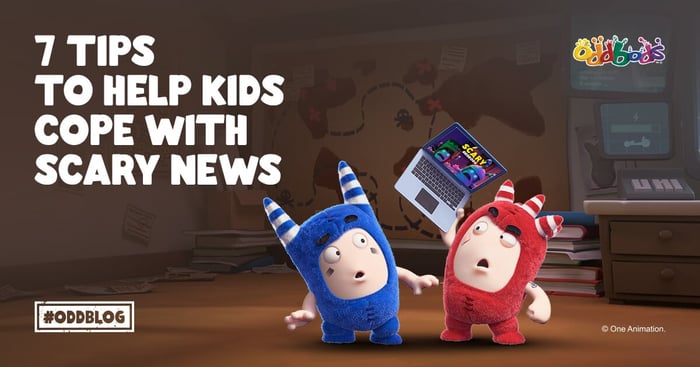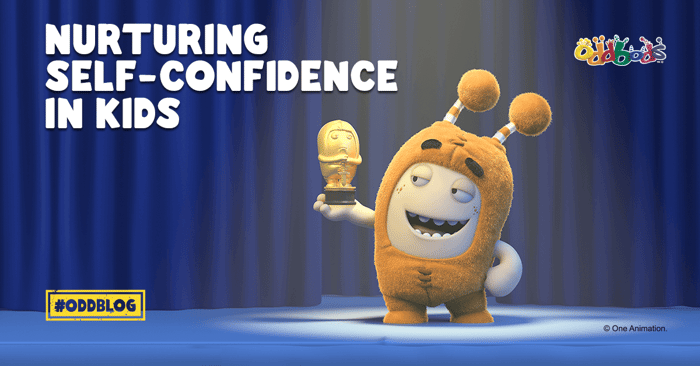News is flashing up all around us 24/7. Especially in this digital era, it is difficult to completely filter or shield our little ones from scary or distressing coverage of events online.
As parents, we would like to protect our kids at all costs or hide the reality from them, so they do not get affected by the alarming happenings hitting the headlines. As tempting as that might be, this is only a short-term solution — in the long term, it is advisable to teach and provide them with solutions and tools to cope with such content.
There is no guidebook to parenting, and sometimes, it can be challenging to know what the “right” moves are. No child is the same, and what matters is that you’re constantly trying and improving as you go along this parenting journey. If your little ones are in their “terrific” twos and threes , and starting to get more exposed to the realities of the world, here are some valuable tips you can use to help them cope with frightening world news.
1. Take preventive measures — talk to your child before it happens
Having regular check-in talks with your children will help to foster a sense of security. Photo by Monstera.
As they say, prevention is better than cure. It is better to take preventive measures and talk to your child before handing them a digital device. Pre-empt them that they might see unpleasant or frightening news online, and encourage them to come to you if they see something disturbing that upsets them.
While the conversation might be hard to broach, taking a proactive stance will help your little one feel safe and more prepared for when they encounter such scary world news.
These conversations should also happen regularly; having check-in talks with them will also help to foster a sense of security and remind your child that you and other adults are there for them.
2. Encourage curiosity and a culture of openness
It is important to cultivate a culture of openness within the family so that your little ones do not fear sharing their thoughts and emotions. Let them know that no subject is off-limits, encourage curiosity and questions, and reassure them that it is okay to ask about scary and difficult things.
You can start by asking what they have seen or heard and what the information means to them. This will also help you learn more about your kid’s thoughts and uncover any misperceptions or unfounded fears which need correcting.
3. Be honest with them!
It might be tempting to bend or twist the truth when your kids ask you tricky questions; however, this will confuse them and will not be helpful should they engage in conversations relating to the topic with their friends.
One way to navigate such situations is to answer their questions matter-of-factly without exaggerating or spilling out every little detail of a violent or gory event. Younger children might need more time to process information, so explain patiently instead of brushing them off.
Additionally, if you are not sure of the facts, be honest and tell them so rather than spinning up a response.
4. Remind them how news works
It is also important to teach and remind them how news works. News reports might be making things seem more severe than they are (media sensationalism), and terrible events are on the news because they are rare and do not happen very often. Doing so helps to put any scary events they come across into perspective and prevents them from over-worrying.
5. Reassure them that it is normal to feel what they’re feeling
When your little ones come across scary news, they might feel sad, scared, disgusted, worried or concerned. It is normal for them to feel overwhelmed with emotions, and as parents, reassuring them gently and calmly will go a long way in helping them understand that such feelings do not make them “bad”, “abnormal”, or different.
This also helps to validate their emotions and positively reinforces them to continue sharing their feelings the next time they feel the same way.
6. Use it as a teachable moment
When you’re on the topic of disturbing and scary things happening around the world, it is also a good time to teach your children values such as kindness and compassion.
Part of the conversation could include how they can pitch in to help or offer support to the people in need, such as donating to a relief organisation or working with charitable organisations as part of a family project. This helps to inculcate a sense of agency in them which can significantly reduce a child’s anxiety.
7. Teach them what NOT to do
Explaining the consequences of their actions in an age-appropriate way will help them understand the gravity of their actions. Photo by August de Richelieu .
Besides teaching them what to do and how to cope when they are faced with scary world news, it is also important to tell them what NOT to do.
For example, remind them not to share or disseminate the content to others or younger children who might not know how to deal with such information. This includes spreading misinformation to sensationalise the news.
It helps if they understand the consequences of their actions — explain how oversharing or spreading fake news can negatively affect other children who may or may not be equipped with the right coping strategies to process such information.
Tune in to your kid’s feelings
Ultimately, scary world news is inevitable, and trying to shield our little ones from adverse events and feelings is challenging and counterproductive. Instead, as parents, we can help them cope by providing a listening ear, being communicative and gentle in our approach, and reassuring them that they know that they are not alone. So don’t you worry, you’ve got this!





